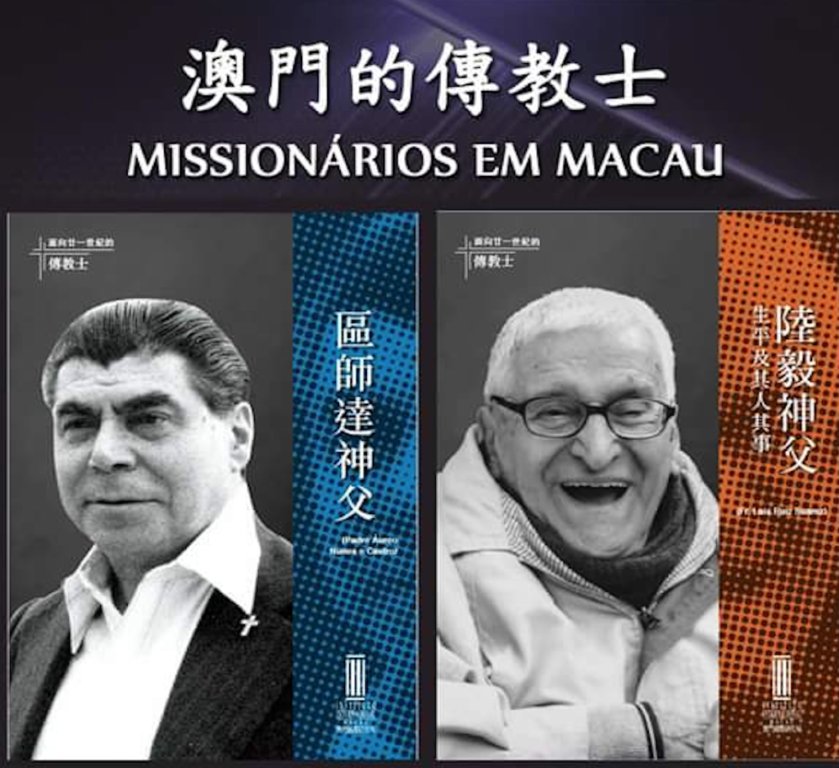Marco Carvalho
Written by Ieong Chi Chi Chau and published by the International Institute of Macau, the book is the first biography of Father Luis Ruiz ever released. The Chinese language translation of Father Áureo Castro’s biography, written in 2016 by João Guedes, will also be launched this Friday.
The auditorium of the Episcopal Palace, nestled next to the magnificent Cathedral of Our Lady, will host this afternoon the launching of two Chinese-language books on the life and works of two of the most important figures of Macau’s Catholic Church in the second half of the the twentieth century: the priest, musician and pedagogue Áureo Castro and the Jesuit missionary Luis Ruiz Suarez.
The two tomes are the result of a joint effort undertaken by the Diocese of Macau and the International Institute of Macau (IIM), in close cooperation with the the Seminary of St Joseph Old Students Associations.
The volumes – which are part of the Missionaries in Macau series, published by IIM – were written by João Guedes, a well-known journalist and historian, and by Professor Ieong Chi Chau, a former vice-president of the Chinese Educators’ Association of Macau.
The biography of Father Áureo Castro is little more than the translation into Chinese of the homonymous work written by João Guedes in 2016, but the book about Luis Ruiz is a work entirely new. The book – whose translation into Portuguese is currently underway – is the first ever biography written about the Spanish missionary, who died in July 2011, aged 97.
A pioneer in the reception of the refugees who fled China following the civil war between Kuomintang and Chinese Communist Party forces, founder of Caritas Macau and the creator of Casa Ricci Social Services, Luiz Ruiz Suarez is still known today as the “father of the poor.” A disciple of the Asturian Jesuit and his successor at the head of the Casa Ricci, Fernando Azpiroz sees the book now released as a well-deserved tribute to someone who has always carried China in his heart: “His heart was in China. He used to go to Mainland China with the purpose of getting acquainted with different realities, namely with those who needed support the most,” explains the Argentine Jesuit.
“When he first came to Macau, Father Ruiz was also – and to a certain extent – a refugee. He was sick and lived in the house where we now have our facilities. During his convalescence, he realized that there were thousands of people who, like him, had been forced to flee China. The big difference, he understood, was that he had a community that supported him and had something to eat,” adds Father Azpiroz.
Well aware of the needs of the enormous tide of souls that flowed into Macau the early 1950s, the “father of the poor” made a decision that would forever change the way Social Services were viewed in Macau: “While in recovery, Father Ruiz decided to open the doors of Casa Ricci to the other refugees fleeing the Civil War. He began with the basics, by distributing rice and flour,” the Argentine Jesuit recalls.
Almost four decades after being forced to flee, Luis Ruiz returned to Mainland China and took on the mission of taking care of the “poorest of the poor,”, the victims of leprosy and HIV / AIDS.
More than three decades later, Casa Ricci Social Services, gives assistance to four thousand people spread over almost two dozen centers scattered all over China.
By launching the two new books, the International Institute of Macao wants to “bring communities closer together” and to promote “a deeper knowledge of the workers and legions of servants of the Diocese of Macau – including priests, missionaries and lay people – who helped to build Macau’s cultural identity and heritage,” IIM stated in a press release.
During the book launching ceremony, the Saint Thomas Choir will perform some of the most renowned compositions for Áureo Castro, in a tribute to the Azorean composer and priest, deceased in 1993.


 Follow
Follow


